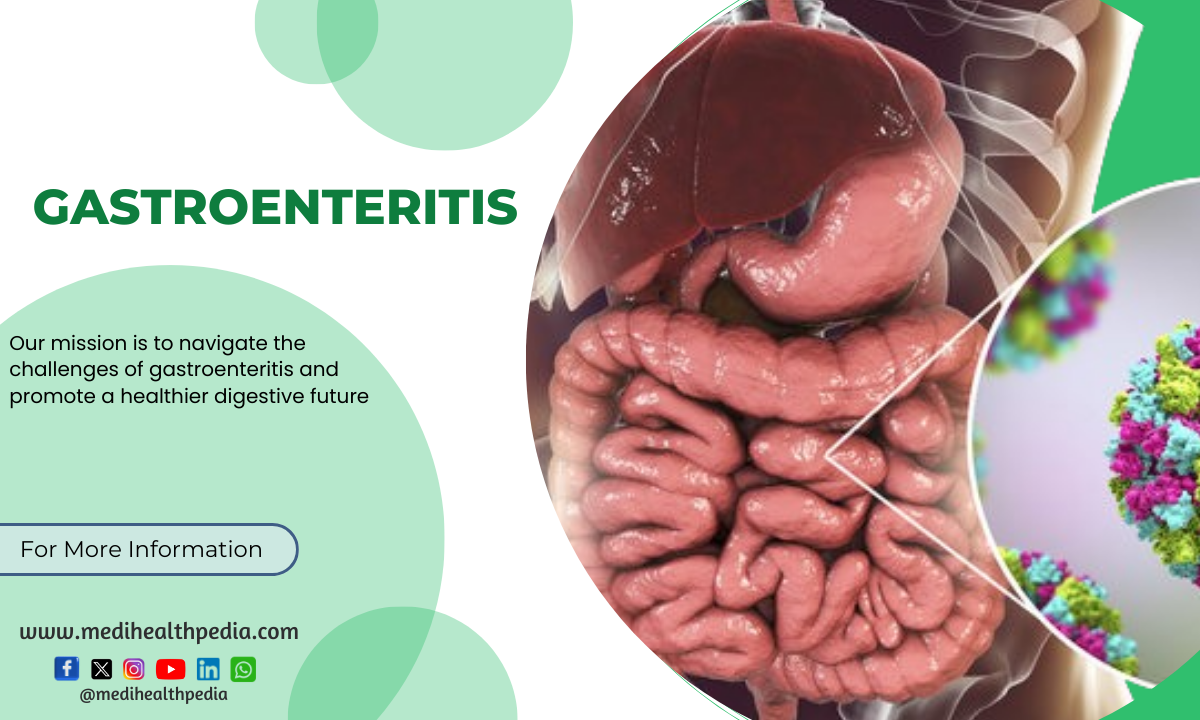Comprehensive Guide to Gastroenteritis: Types, Symptoms, Diagnosis, Treatment, and Prevention
Introduction
Gastroenteritis is a common medical condition that affects millions of people worldwide. It’s often referred to as the stomach flu or stomach bug, but it’s important to note that it’s not caused by the influenza virus. This article will provide a comprehensive overview of gastroenteritis, including its types, clinical presentation, diagnostic workup, potential complications, conventional treatment options, prevention strategies, herbal remedies, lifestyle modifications, and a conclusion on managing this gastrointestinal ailment.

Types of Gastroenteritis
- Gastroenteritis can be classified into several types based on its causes:
- a. Viral Gastroenteritis
- Rotavirus: Common in infants and young children, this virus is a leading cause of severe diarrhea and vomiting.
- Norovirus: Often associated with outbreaks on cruise ships, norovirus causes sudden onset of symptoms and is highly contagious.
- Adenovirus: A group of viruses that can cause gastroenteritis, with symptoms varying depending on the specific strain.
- b. Bacterial Gastroenteritis
- Salmonella: Transmitted through contaminated food or water, causing symptoms like diarrhea, fever, and abdominal cramps.
- Campylobacter: Typically contracted from undercooked poultry, this bacterium leads to diarrhea, abdominal pain, and fever.
- E. coli (Escherichia coli): Certain strains can cause severe gastroenteritis, leading to bloody diarrhea and potentially life-threatening complications.
- Shigella: Highly contagious, this bacterium is responsible for shigellosis, characterized by diarrhea, abdominal cramps, and fever.
- c. Parasitic Gastroenteritis
- Giardia lamblia: A parasite commonly found in contaminated water sources, leading to diarrhea, abdominal cramps, and weight loss.
- Entamoeba histolytica: Causes a condition known as amebiasis, leading to bloody diarrhea and liver abscesses.
Clinical Overview
Gastroenteritis primarily affects the gastrointestinal system, leading to inflammation of the stomach and intestines. This inflammation disrupts the normal digestive process and causes symptoms such as diarrhea, vomiting, abdominal pain, and, in some cases, fever. The severity and duration of symptoms can vary depending on the cause of gastroenteritis and the individual’s overall health.
Clinical Presentation
The clinical presentation of gastroenteritis can be quite distressing. Common symptoms include:
- Diarrhea: Frequent, loose, and watery bowel movements.
- Vomiting: Sometimes severe and persistent, leading to dehydration.
- Abdominal Pain and Cramps: Often localized in the lower abdomen.
- Fever: Occurs in some cases, especially with bacterial or parasitic gastroenteritis.
- Nausea: Feeling of queasiness and a lack of appetite.
- Dehydration: Can result from fluid loss due to diarrhea and vomiting.
- Muscle Aches: Sometimes experienced, especially with viral gastroenteritis.
Diagnostic Workup
When you experience the symptoms of gastroenteritis, it’s essential to consult a healthcare professional for a proper diagnosis. The diagnostic workup may include:
- Clinical Assessment: Your healthcare provider will evaluate your symptoms and medical history.
- Physical Examination: A physical exam may reveal signs of dehydration and abdominal tenderness.
- Stool Sample Analysis: In cases of suspected bacterial or parasitic gastroenteritis, a stool sample may be analyzed to identify the causative agent.
- Blood Tests: Blood tests can help determine the presence of infection or assess the severity of dehydration.
- Imaging: In severe cases or when complications are suspected, imaging studies like abdominal X-rays or CT scans may be ordered.
Complications
Gastroenteritis is typically a self-limiting condition that resolves on its own. However, in some cases, it can lead to complications, especially when left untreated or in vulnerable populations such as the very young, the elderly, or those with weakened immune systems. Potential complications include:
- Dehydration: The loss of fluids through diarrhea and vomiting can lead to dehydration, which may require medical intervention.
- Electrolyte Imbalance: Dehydration can disrupt the balance of electrolytes in the body, potentially leading to cardiac and neurological issues.
- Kidney Dysfunction: In severe cases of dehydration, kidney function may be impaired.
- Malnutrition: Prolonged gastroenteritis can lead to malnutrition due to the inability to absorb nutrients.
- Secondary Infections: Weakened immune systems may make individuals more susceptible to secondary infections.
Conventional Treatment
Treatment for gastroenteritis primarily focuses on symptom relief and preventing dehydration. Common approaches include:
- Fluid Replacement: Rehydration with oral rehydration solutions (ORS) or intravenous (IV) fluids may be necessary to combat dehydration.
- Medications: Antiemetics (anti-vomiting) and antidiarrheal medications may be prescribed in some cases, but they are not recommended for all types of gastroenteritis.
- Nutrition: Maintaining a light diet and avoiding heavy or spicy foods can help ease symptoms.
- Rest: Adequate rest is essential to recover from gastroenteritis.
- Antibiotics: Only prescribed for bacterial gastroenteritis, and the choice of antibiotics depends on the specific bacteria causing the infection.
Prevention
Preventing gastroenteritis involves a combination of hygiene, safe food practices, and vaccination in some cases. Here are some preventive measures:
- Hand Hygiene: Regular handwashing with soap and water is crucial to prevent the spread of gastroenteritis.
- Safe Food Handling: Ensure that food is properly cooked, stored, and prepared to prevent contamination.
- Clean Drinking Water: Consume safe, clean water to prevent waterborne infections.
- Vaccination: For specific types of viral gastroenteritis like rotavirus, vaccines are available and recommended for children.
- Avoiding Close Contact: Stay away from individuals with symptoms of gastroenteritis to prevent transmission.
Herbal Medicines for Treatment
In addition to conventional treatments, some herbal remedies may help alleviate the symptoms of gastroenteritis. However, it’s essential to consult with a healthcare professional before using any herbal remedies, especially in cases involving children, the elderly, or individuals with underlying health conditions. Here are a few herbal options that are sometimes considered:
- Ginger: Ginger is known for its anti-nausea properties. Ginger tea or ginger capsules may help reduce nausea and vomiting.
- Peppermint: Peppermint tea or oil can help soothe digestive discomfort and reduce abdominal pain.
- Chamomile: Chamomile tea has anti-inflammatory properties that can alleviate stomach cramps and discomfort.
- Activated Charcoal: Activated charcoal may help absorb toxins and gas in the digestive tract, reducing symptoms.
- Probiotics: Probiotic supplements or foods like yogurt can help restore a healthy balance of gut bacteria, potentially speeding up recovery.
Remember that herbal remedies should not replace conventional treatment for severe cases of gastroenteritis or those with significant complications.
Lifestyle Modifications
Apart from herbal remedies, making certain lifestyle changes can aid in the management of gastroenteritis:
- Rest: Allow your body time to heal by getting adequate rest.
- Hydration: Drink plenty of clear fluids to stay hydrated, including water, clear broths, and oral rehydration solutions.
- Diet: Stick to a bland diet consisting of rice, toast, applesauce, and bananas (the BRAT diet) to ease digestion.
- Avoid Irritants: Stay away from alcohol, caffeine, and spicy foods that can irritate the digestive system.
- Isolation: If you’re infected, practice good hygiene and isolation to prevent the spread of the illness to others.
- Gradual Return to Regular Diet: As symptoms improve, gradually reintroduce regular foods into your diet.
Conclusion
Gastroenteritis, though often referred to as the stomach flu, is a condition that affects the gastrointestinal system and can be caused by various infectious agents. It presents with symptoms such as diarrhea, vomiting, abdominal pain, and fever. While most cases are self-limiting and resolve on their own, some may lead to complications, particularly in vulnerable populations.
Effective management and prevention strategies include proper hygiene, safe food practices, vaccination (where available), and consulting with healthcare professionals for diagnosis and treatment. In some cases, herbal remedies and lifestyle modifications can complement conventional treatments.
Remember that each individual’s experience with gastroenteritis may vary, and it’s important to seek medical advice when dealing with severe or persistent symptoms. With proper care and preventive measures, the impact of gastroenteritis can be minimized, allowing for a quicker and smoother recovery.

